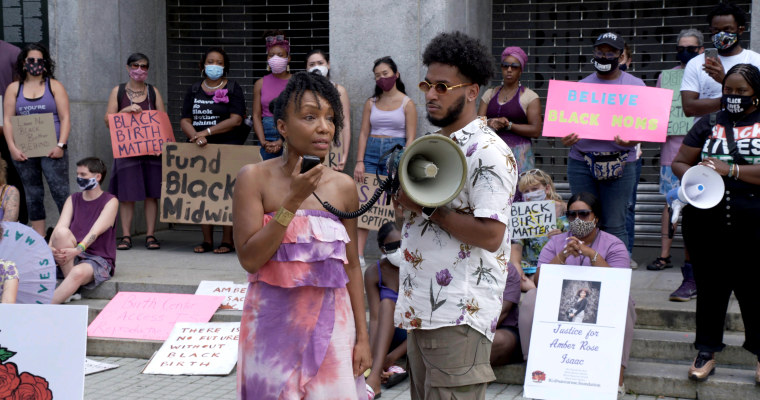Within days of giving birth to her son, 30-year-old Shamony Gibson experienced difficulty breathing. The issue, which she alerted her doctors about, went untreated. Two weeks after her son, Khari, was born, Gibson died from a pulmonary embolism.
In a new documentary, “Aftershock,” which premiered at the Sundance Film Festival, her family blames racism at the hospital for her death.
The documentary follows the aftermath of Gibson’s death in 2019 and examines the issue of the disproportionately high maternal mortality rate for Black women in the U.S. The film, by Tonya Lewis Lee and Paula Eiselt, chronicles the lives of the women’s families as they cope with loss and turn it into action.
Along with Gibson, the documentary focuses on the death of Amber Rose Isaac, who also lived in Brooklyn, New York. Isaac’s platelet levels, which are vital for blood to clot, began dropping months before her delivery date.
The issue was only taken seriously by her medical providers after she documented her mistreatment by the doctors and medical staff of her Brooklyn hospital in viral tweets.
After running several tests, she was diagnosed with HELLP syndrome, a life-threatening pregnancy complication associated with pre-eclampsia. Isaac died four days later, after an emergency cesarean section. She was 26.
In the United States, Black mothers are three times more likely to die in childbirth than white mothers.
“The neighborhood that you live in has a big influence on the resources you have access to to be healthy,” Dr. Neel Shah, an OB-GYN and Harvard University medical school professor, told NBC News.
Shah is also an advocate for maternal justice who makes appearances throughout the documentary to discuss the impact of systematic racism on maternal health care.
“Maternal mortality is higher for people who are Black, across the whole country,” Shah said. “But if you’re Black in New York City, you’re 8 to 12 times more likely to die in childbirth. That’s because there’s a huge difference between living in the Bronx than living on the Upper East Side in terms of just access to resources and disinvestment in hospitals and infrastructure.”
Prior to “Aftershock,” Lewis Lee produced a documentary years before called “Crisis in the Crib” which explored the Black infant mortality rate. Similarly to the maternal mortality rate, the infant mortality rate in the U.S. among Black people is higher than for any other race.
“We wanted to take you on a journey of how people have to navigate the system, as well as what it’s like when you’re lost and sort of the resilience that these people can have to make change.” Lewis Lee said.
"Aftershock" began filming in 2020 during the resurgence of the Black Lives Matter movement. Along with the issue of overhauling police came the way in which Black Americans were viewed in the health care system.
Medical programs have often taught anti-Black sentiments, such as Black people have a higher threshold of pain. This stems from centuries of experimentation on Black bodies, for example, in the development of modern gynecology.
According to the Centers for Disease Control and Prevention, most pregnancy related deaths are preventable.
“I wanted to create conversation and how we think about birthing personally for my daughter, for my grandchildren and great-grandchildren, who hopefully will come down the line,” Lewis Lee said. “I acknowledge that I may not actually see what we start to set in motion, but that’s OK. Because someone else is going to continue to pick up the mantle and take it further.”
For Lewis Lee and Eiselt, it was never about making the entire documentary tragic, but turning a disheartening event into a beautiful showcase of family. “Aftershock” leaps between moments of protests to moments of joy. The film celebrates Black fatherhood and the resilient nature of men who come together after losing loved ones. Isaac’s partner, Bruce McIntyre III, created the Save a Rose Foundation to create conversations on maternal justice in low-income communities. Omani Maynard, Gibson’s partner, and McIntyre share their grief — and growth — throughout the film.
“It was a real pleasure to be able to show how these men come together and support one another across state lines, across economic lines, and just sharing in the unfortunate tragedy that they all have endured,” Eiselt said.
For the families, the women live as part of a broad, ongoing movement to spark change in maternal care. Last year, President Joe Biden issued the first presidential proclamation for Black Maternal Health Week, acknowledging the importance of addressing the Black maternal mortality crisis.
However, Lewis Lee and Eiselt say this is only a minor step in dismantling the racism within Black maternal care, but hope that through their film, more advocacy and outcry will arise.
“We don’t want people to walk away from this film scared to give birth. We want them to feel empowered — that there are solutions and options we can integrate on a national level,” Eiselt said. “We want people to be talking and to be propelled to action.”
